Thornwatch
Developer: Chad Brown, Jerry Holkins, Mike Krahulik, Mike Selinker, Rodney Thompson
Publisher: Lone Shark Games, Penny Arcade
Number of Players: 3 - 6
Price: $79.95
Copy Provided By Publisher
Sometimes I wonder if, as a reviewer, I’m reaching that point where new games excite me less than they used to. As part of a new year’s gaming resolution, I’m trying to get back to my gaming roots of being a little less judgmental about a synopsis of game mechanics or skimming a rulebook; I’m trying to get back to what makes those games fun when they’re in motion on the table. Less pre-criticism, and more “just try it and see if you like it.” Dive in! Enjoy the adventure. I used to have such fun as my fingertips tingled in anticipation, eager for anything a box full of cardboard and plastic might throw my way. These days it feels like I’ve lost touch with that sense of adventure, both in games and around the table.
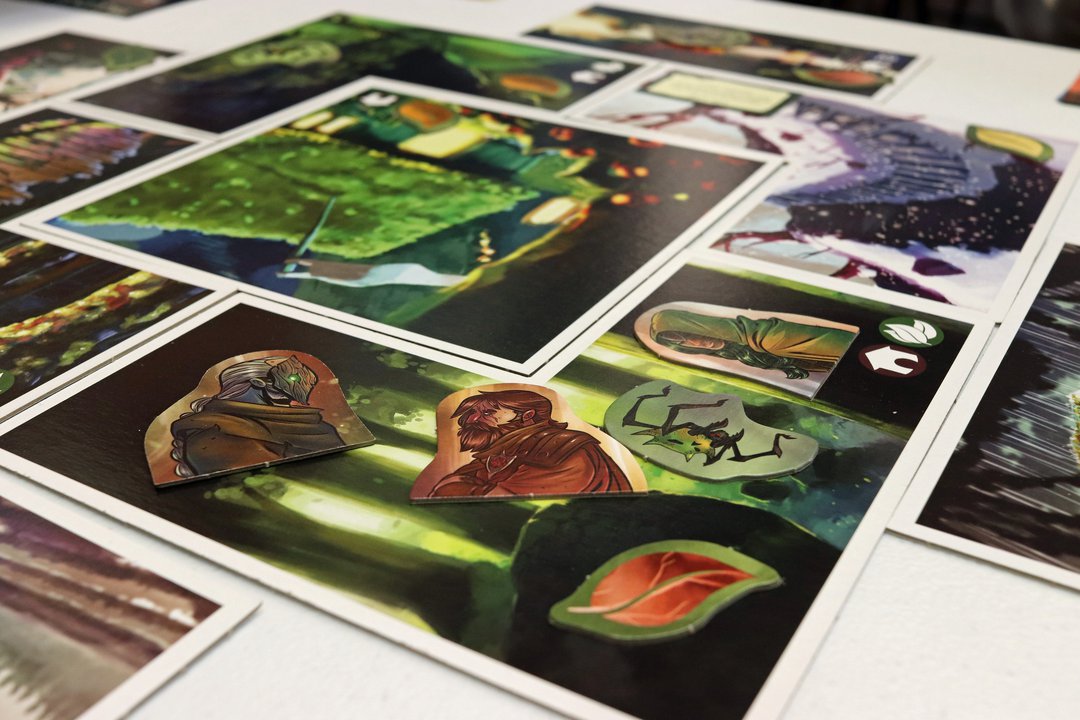
Fortunately for me, adventure is exactly what I found when I cracked open Thornwatch. I've pitched this game to newcomers at game night as “light D&D in-a-box,” but that hardly does it justice. In this box you get branching storycards, all able to be strung together into a little campaign, each with unique objectives to supplement combat. Combat itself changes depending on which monsters you face and which heroes are in play. And of course, you get the heroes of the Thornwatch: spirit guardians who are bound to service when summoned, defenders of those who live in a dangerous and dark wood.
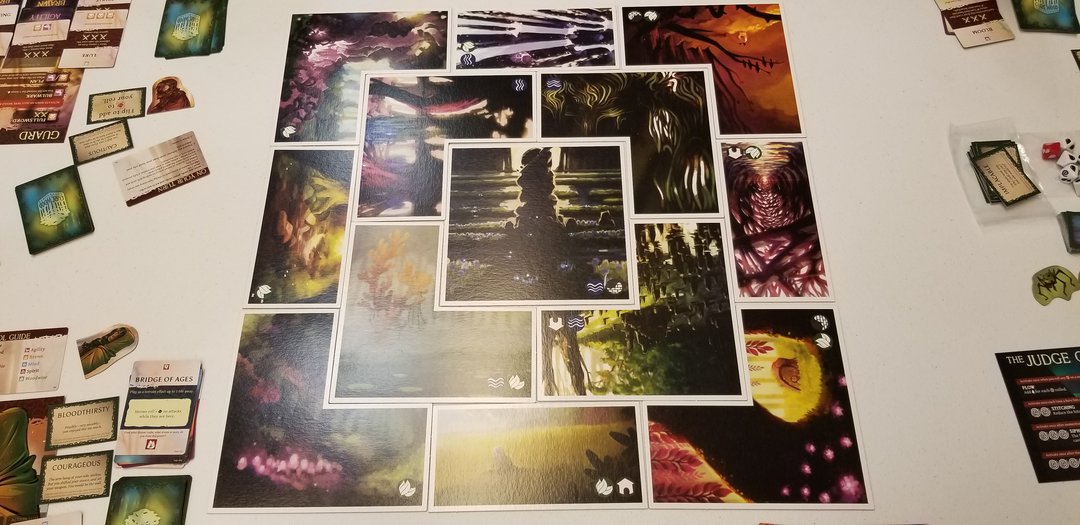
The modular setup means that you can not only mess with stuff like terrain effects, you can create scenarios to your own liking if you tire of what's in the box.
If you've read my take on the last game I reviewed from Lone Shark Games, The Ninth World, you know that my biggest complaint was the lack of strong theme in a wondrous setting I had no buy-in with. I'm happy to report that, with a similar lack of familiarity with the source material, Thornwatch is every bit the game I was hoping it would be, although not without its own rough edges. Is it for you? Lets summon it and see.
Preparing For The Challenge Ahead
There’s a lot to talk about in regards to this comic inspired dungeon crawler, and there's a lot to like when you get it to the table. Before that though, I’m going to get my criticisms out of the way at the start here, and they're not going to be pretty. There’s no easy way to put this: the rulebook is easily the worst rulebook I’ve read possibly ever to date. I don't say this lightly; I've dealt with the odd misstep here and there in all the rules I've read and all the games I've learned, and I'd like to say I've seen it all. But Thornwatch's rulebook seems to pile it all on at once: wordy, overwritten passages that obscure what they're trying to say; giving too much thematic description when it should give just the basics first. There are unclear examples of mechanics, confusingly phrased language, and a lack of appendix or any way to easily reference rules questions while in play. Some of the rules were offloaded to the components themselves, while other parts were kept just in the book. That last part could have been a smart design choice, but its not consistent about where things are, and when you need to swap between them. I'll avoid speculation as to how it was left in this state before going into production, but sufficed to say it's a hot mess.
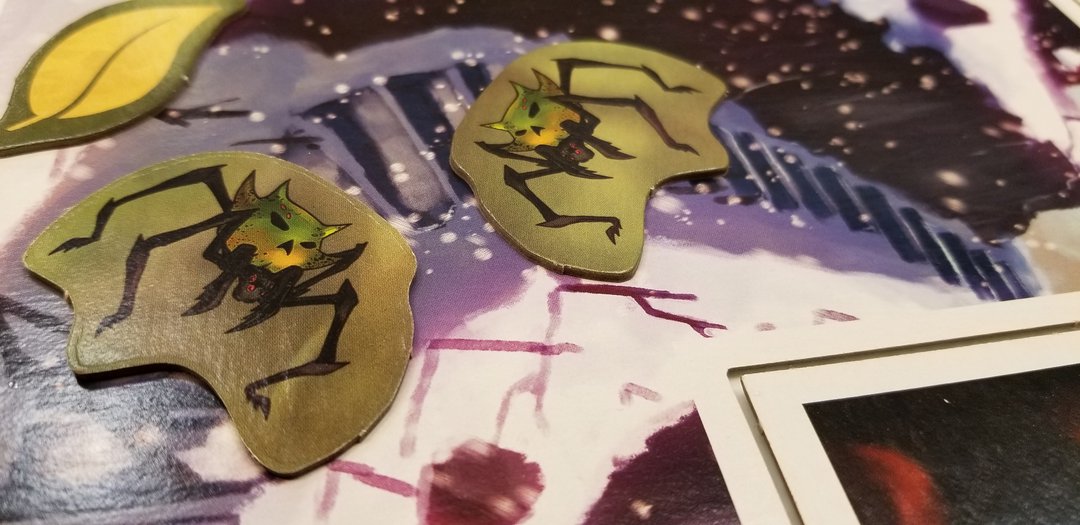
Despite its drawbacks, it's refreshing to see a game with nice art on cardboard rather than $500 in minis. This game is very affordable!
We played this game wrong three times before we finally got everything right. Three. Times. Again, misplays happen, and I've had my fair share of messed up first games in all the titles I've played with family and friends. Still, it's rare for me, let alone a whole group of gamers collaborating, to play a game wrong more than once or twice, and rarer still to get it wrong a third time through. It is a shame that this happened, mainly because the game overall isn't really that complex at its core! It was often a rule as small as a single sentence within its respective section, but then not referenced again either in later examples. It's the kind of thing you have to memorize front to back, and some of our early misplays swung game balance wildly out of whack.
A Game That Was Summoned Again And Again
You might think that I threw Thornwatch out of a window before it ever got to our game night table, but you'd be wrong. I gave it a fair shot to impress, and everyone that got a chance to play it certainly found something to like! Even misplaying our first games, everyone had a great time, myself included. On top of this, each time Wyatt or I caught something we missed, I kept saying “let's just play one more to see if it gets even better", and we were just find with that. Just one more, just one more: that's how we knew there was something special behind all the clutter in the rules.
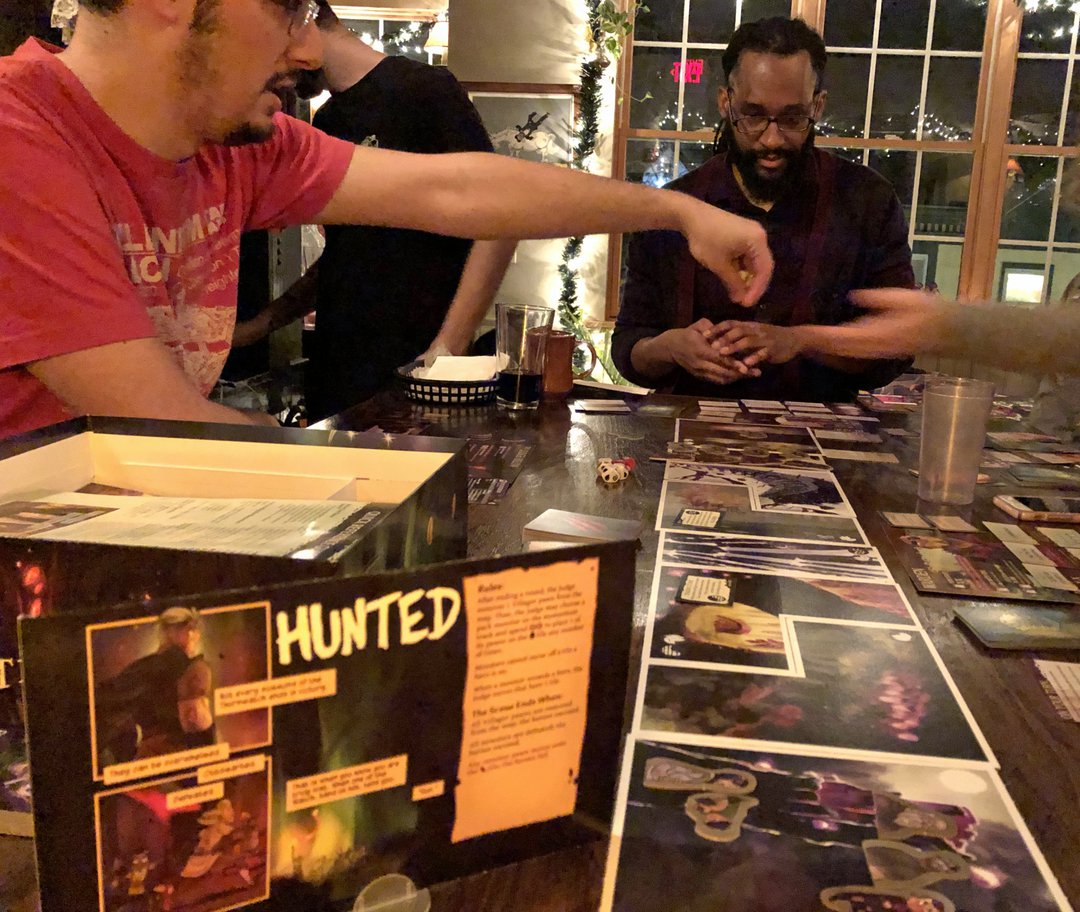
A game of Thornwatch is comprised of an opener and a closer, with the chance for multiple branching side scenes between. Be warned - if you do poorly in the opener, you might end up in a bad situation...
Once we cleared the learning hurdles, Thornwatch revealed to us everything the glossy box with its dark, cartoony art promised. A graphic novel panel fixed into a stand near the board briefed us on the scene taking place. It could be the painting of a woodwife - a kind of tree creature meets bog witch - who swindled a forest family into surrendering their baby as payment for some dark deal. The Thornwatch is summoned by the desperate family to retrieve the child. Each game pits the players against not only a new selection of monsters with unique attacks and powers but also a unique set of objectives to the story chapter which give both them and the Judge player more tactical options to pull for victory. That's right, there's a one to face off against the many; the Judge's job is to control the monsters but also to help tell the story as it progresses.
Remember how I mentioned at the start how I pitch this game as a light tabletop RPG experience? Well it's the Judge who moves the story along in that respect, similar to a dungeon master. For example, players are dealt personality traits during setup, and it's the Judge who gets a final say in rewarding players for acting their parts, potentially netting them valuable bonus dice they can use at critical moments down the road. The Judge and the players work together, as well, deciding how much they'd like to play in a particular story. Do they play the “opener” and “closer” chapters in one evening? Or do they decide to take a “branch” path and play additional chapters before wrapping things up. This game walks a fine line between a competitive game and a story-based game, but it does so pretty well as long as the Judge remembers it's not all about them winning every chapter.
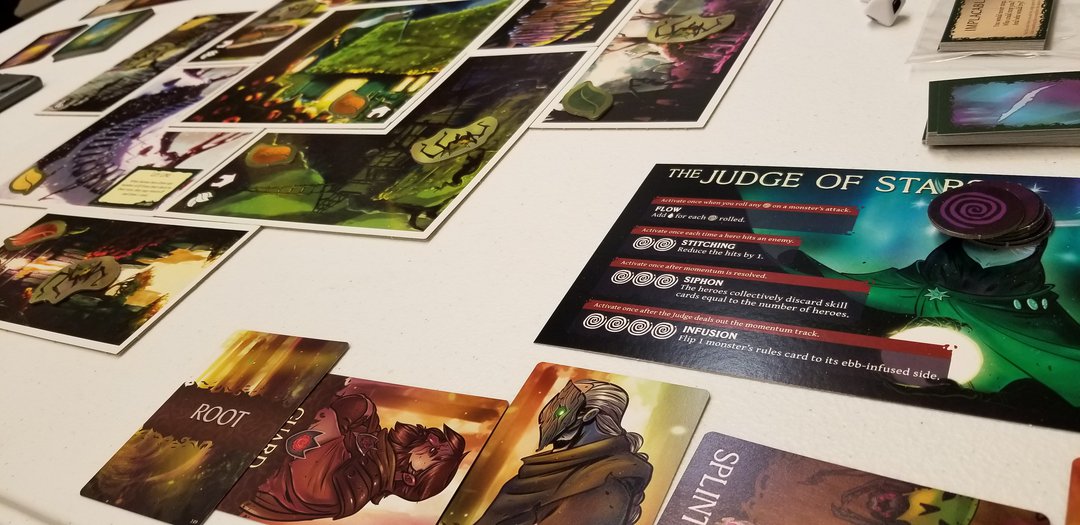
More of the evocative and quite lovely artwork that Lone Shark gets into its games.
Reading Between The Lines
Thornwatch's mechanics are pretty straight forward when you stop to consider them. On your turn you can slot in any amount of cards from your hand to power special abilities and attacks, take one move, and do one action (usually attacking or popping one of those slotted special powers, though sometimes you can interact with objectives as well) in any order. There's a neat initiative track that also acts as monster health, making enemies slower as they take more damage on their way to being slain. You and the monsters take their turns in initiative order and repeat the process until someone's dead (usually the monsters as the heroes just get clogged with wound cards) or the objectives reach a tipping point. All these streamlined elements help the game move at a fair clip and let you get potentially a whole story (multiple chapters) played in one night. Though nothing stops you from “saving” and continuing later. But that's not where this game really shines.
Sure, combat is fluid and fun, but it's in the fact that it's also thematic that really makes this game special. I'll put it this way: have you ever rolled perfectly on a die and, rather than simply swiping the targeted piece off the board, tossed in a bit of narration spurred on by your own imagination? “Yep, that crit right there totally takes the goblin's head off in a clean swipe!” This game actually encourages and rewards you for doing that! As if on cue, where flavor text on cards would normally be located, each special action card of the Thornwatch players has a prompt to help if you're stuck. Why does that lifeless husk enemy freeze when the Sage targets him with a channeled vision from beyond? Shouldn't that be ineffective on a zombie? Wyatt's explanation was that perhaps he remembers who he used to be. We didn't always need these prompts when we played, but it's nice that they were there on some of the more esoteric powers.
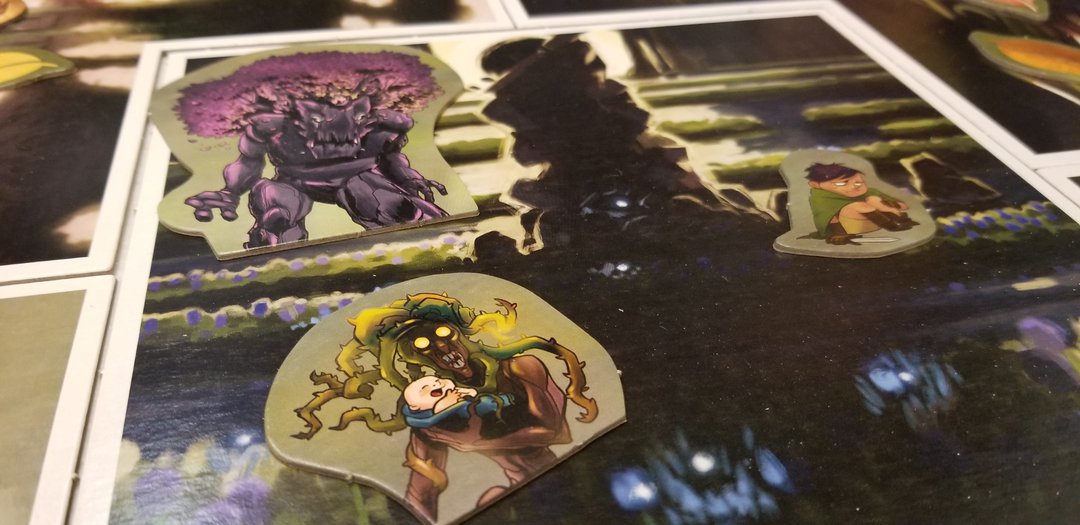
This game comes with a whole lot of monsters. Some of which overlap two map tiles because they're so huge! I can't wait to sick them on my friends.
The fact that this game seems to know how players will narrate things simply by playing within its world, and heads them off at the pass by rewarding them with those aforementioned bonus dice, really solidifies for me that this game delivers its targeted experience to its targeted audience in a meaningful and well thought out way. It wants you to get into the spirit of things! So slot up some card powers, and perhaps if one of your traits is “reckless” consider letting yourself go and just tossing your Warden headlong into the enemy horde!
And So The Story Closes
We've had a great time with Thornwatch at our local game nights. The base box nets you four sets of starter and closer chapters along with multiple branches to toss in between, modular boards that allow you to spice up setups, terrain cards to further season your scenarios, and the ability to play your hero as a man or woman (a classy touch I always appreciate). So I wholeheartedly recommend it to anyone looking for a solid mix of a quick playing, objective-based dungeon crawler meets self-contained, light RPG.
If...
I recommend this game if you aren't bothered by the thought getting through rocky rules back to front before game night. Read and reread the questionable rulebook, play against yourself in a sample game, or see if you can find a how-to-play video online. However you do it, be aware learning the game properly will be the biggest downside you face; then again, for some reason Wyatt didn't seem bothered in the least by the rulebook, so if you're completely drawn in by the theme your mileage may vary.
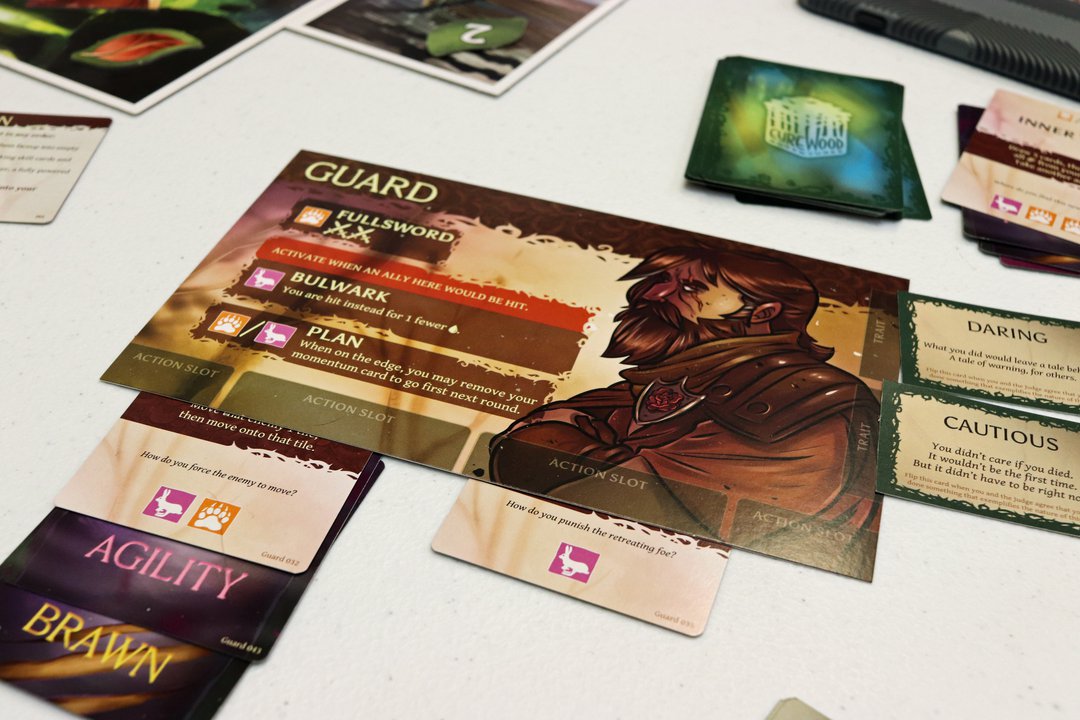
Of course, one of the key draws to Thornwatch comes from its original creators, Penny Arcade: this is a game that drips with art and theme.
On the other hand, I'd caution against this game if your group plays "one versus many" games in a competitive manner. The Judge, while the antagonist, still needs to reward good roleplaying even though it means hurting themselves in the future as players roll more dice. If your group finds it difficult to play games, while keeping victory in mind, just “for the fun of seeing what happens,” you may want to pass here. This game is at its best when people are into it, so if your group really couldn't care less about at least giving a little narration of what happens when they swing those swords, this game will probably won't excite you like it did for us.
For everyone else, what's on offer here is a well-illustrated, fast-paced, "wait, we're fighting WHAT because it's HOW bad?!" kind of time. Thornwatch brings together story and narrative in an accessible to play package that I think will keep it's spot on my gaming shelf. If your group is the type to toss in those little narrative flourishes for successes or failures in pretty much any game you play, and you think a cinematic defeat is just as much a spectacle as a heroic win, do yourselves a favor and check it out.